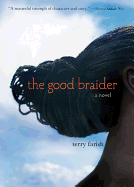
In this eloquent free-verse novel, 15-year-old Viola relates the horrors of wartorn Juba, Sudan, in 1999, and her pursuit of freedom in the U.S.
Viola lives with her mother, grandmother and five-year-old brother, Francis. Each day they fear the armed soldiers will come. There is little food, but they make the dense white aseeda to eat and they have each other. Gwendolyn, their very pregnant neighbor, grows groundnuts. Viola trades her a handful of seeds in exchange for watering her crop. One day, while Viola is in Gwendolyn's garden, with Francis a little ways off, a soldier comes to Viola. She tells Francis with her eyes to be silent. He stays quiet, and Viola goes with the soldier in order to protect Francis. The soldier steals her "bride wealth"--he rapes her.
That is not the end of the family's tragedies, but it is also not the end of their happiness. Through Habuba's brother in America, they gain entry to a Sudanese community in Portland, Maine. Viola discovers she is neither in the Sudan nor is she fully in Portland ("I am waiting for myself/ to catch up with/ my body"). But by story's end, Viola has in many ways returned to herself, and she finds ways to honor her heritage.
Viola describes her surroundings through all five senses: The "sickening sweet" tobacco smell of the soldier, the exhaust fumes of Cairo where they wait for papers, and her grandmother's loving hands, braiding her hair. Unforgettable. --Jennifer M. Brown, children's editor, Shelf Awareness

